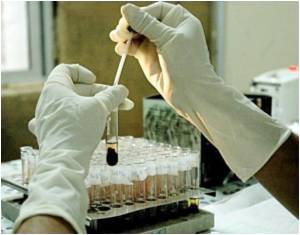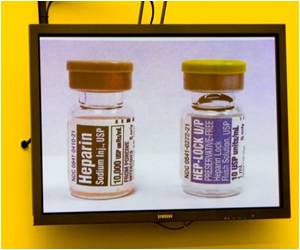At Duke Medicine, researchers have identified a new strategy for treating neuroblastoma using a modified version of heparin, a century-old injectable drug that thins the blood to prevent clots from forming.

"Our research translates mechanistic insights about heparin into a potential new therapy for neuroblastoma, and possibly other cancers," said senior author Gerard C. Blobe, M.D., Ph.D., professor of medicine, pharmacology and cancer biology at Duke.
Neuroblastoma is a cancer that arises in nerve tissue, and is typically seen in infants and children. While neuroblastoma is rare overall - 700 new cases in the United States each year, according to the American Cancer Society - it is the most common cancer in infants.
Despite numerous treatment options for neuroblastoma, survival rates in children with advanced cancer are less than 40 percent due to disease recurrence and the persistence of residual cancerous cells after chemotherapy. However, one difference between neuroblastoma and other solid tumors is the function of the stroma, or connective tissue around the tumor.
"Most of the time we think of stroma in solid tumors as a bad thing that helps cancers become more invasive. In neuroblastoma, it's the opposite: having a lot of connective tissue around the tumor does something favorable for patients," Blobe said.
Studying the stroma's biology, the researchers determined that the connective tissue produces and releases receptors involved in nervous system signaling called heparan sulfate proteoglycans. The heparan sulfate proteoglycans had a differentiating effect on the cancer cells, making immature cancer cells act more like mature neurons and keeping them from proliferating.
"That's what caused the eureka moment. Heparin was effective, but caused serious bleeding," said Erik H. Knelson, an M.D./Ph.D. candidate at Duke University School of Medicine and the study's lead author. "If we could find a modified heparin that still promoted differentiation but did not cause anticoagulation, we might have a successful treatment."
When tested in lab cultures, the heparin derivative suppressed neuroblastoma growth. In mice, it slowed the cancer's progression, shrunk the tumors and extended the animals' lives.
"The study illustrates the benefit of listening to the cancer and its biology," Knelson said. "We started out with an investigation of tumor stroma and its mechanism, and designed a potential therapy using this new understanding."
The team is now working to move the research into clinical trials in humans to determine whether the heparin derivative offers the same benefit in humans as it did in mice.
"We want to repurpose a drug that's already out there for the benefit of patients," Blobe said. "What's exciting about that is there are other tumors in which differentiation is useful, so there's the potential to apply these insights to other cancers."
In addition to Blobe and Knelson, study authors include Angela L. Gaviglio of the Department of Pharmacology and Cancer Biology at Duke; Jasmine C. Nee, Mark D. Starr and Andrew B. Nixon of the Department of Medicine at Duke; and Stephen G. Marcus of Cantex Pharmaceuticals.
The study was supported by the National Institutes of Health (F30 CA168043-01, R01-CA136786 and R01-CA135006) as well as a Reach Award from Alex's Lemonade Stand.
Knelson and Blobe have submitted a U.S. provisional patent application describing the development of heparin derivatives as therapeutic agents in neuroblastoma.
Source-Newswise
 MEDINDIA
MEDINDIA




 Email
Email






